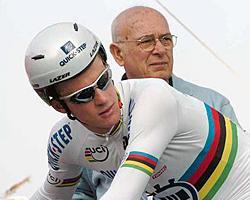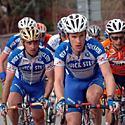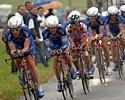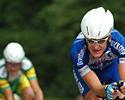
Recently on Cyclingnews.com |
An interview with Michael Rogers, April 7, 2005
Looking to Le Tour

|
With two world time trial championships now under his belt, Michael Rogers is shifting his focus away from the chrono and towards Le Tour. Cyclingnews' Shane Stokes caught up with Rogers in recent days, talking to him about a new approach in 2005, his preparations for the Tour de France and the increased pressure he feels after the retirement of former Quick.Step team-mate Richard Virenque.
Although Australian rider Michael Rogers is still just 25 years of age, he has already has two world time trial championships in his palmares. Now he is turning his focus towards the Tour de France, hoping to build on his 22nd place of 2004. Rogers has shown solid form thus far this season, climbing well in the recent Coppi-Bartali week in Italy. The time between now and the Tour start on July 2nd is about building on that condition, working hard to ensure that he is in the best possible shape on the start ramp in Fromentine.
He has said in the past that his goal is to win the Tour before he stops cycling; staking everything on this year's contest is an important step along the way, in terms of learning more about his capabilities and the delicate art of peaking for the world's biggest bike race.
Cyclingnews: You did quite well at the recent Settimana Internazionale Coppi-Bartali, placing ninth overall there...
Michael Rogers: Yeah, towards the end it was a pretty close race. There weren't really stages where you could make a whole lot of difference. We lost some time in the team time trial. But to finish ninth was positive. Up until now everything is on track for the Tour.
CN: So you are happy with your form at this point?
MR: Yes. There is still a lot of work to do, though. Now for me comes one of the hardest times of the season with a lot of work ahead, but I am really looking forward to it.
CN: What will you do between now and the Tour?
MR: I am going the Tour of the Basque Country and then in May I will probably do the Tour of Catalunya and then probably the Tour of Switzerland. Then the Tour itself.
"There are only a few guys who can actually say: 'On that day, I am going to be good.'"- Rogers on the difficulty of peaking for the Tour de France at just the right time |
CN: At the world championships, you said your goal in cycling was to win the Tour. You are still quite a young rider, 25 years of age, so how soon do you see yourself being in a position to really chase that ambition? Do you have intermediate goals in the meantime?
MR: Well, a lot of people can say they want to win the Tour and to win stages, but I am trying to take it one step at a time. There is no real secret to it, it is about a lot of hard work, a lot of training and preparation. These are the kind of races I believe that you pretty much have to base your whole season around.

|
It is a bit of a risk because if things go bad or if you crash, your whole season can... well, not be a failure, but it probably won't be the way that you want it to be. It is a bit of a risk. It is not easy to say that I am going to turn up on the first of July in top shape. There are only a few guys who can actually say: 'On that day, I am going to be good.'
I think Museeuw was one of them, Van Petegem. Obviously, Armstrong. Possibly Jalabert was another one of those guys. But there are only a few who can actually say that on a specific day, they are going to be in top condition.
CN: So you feel you are still learning about yourself, how to reach a peak?
MR: Certainly, yes. There is so much to learn in this sport, it is not funny! That is one of the things about this sport, until the day you retire you are still learning. I don't think there is anyone in the peloton who knows everything about cycling.
Certainly, I am still learning. I hope I am learning really quick. I feel like I am taking in so much information, especially this year in trying to base my whole season around the Tour. I am learning along the way.
CN: Is that approach different to last season? I mean, in 2004 were you targeting a more general spread of races rather than one specific goal?
MR: Yeah. It is certainly different to last year. Last year we had Virenque, and Bettini was going to the Tour to aim for stages. This year, the general classification is up to me.
CN: Is it fair to say you feel more pressure this year?

|
MR: Yeah, certainly. There is a lot more responsibility. I have a little bit of the weight of the team on me. Obviously Quick.Step is going to take a team which is going to be mostly based around Tom Boonen and the bunch finishes, but I am sure they are going to give me a few guys to help me in the general classification as well.
CN: You have taken two world time trial championships, so you have proven your abilities against the clock. Is climbing the area where you need to develop over the next couple of years?
MR: Certainly. The Tour is done in the mountains. Ideally, you want to be able to compete in the mountains and then make some time in the time trials. In the last few years, Lance has won it in the mountains and the time trials... but generally it is a guy who can limit his losses in the mountains - if any - and then do it in the time trials.
But then again, it takes a variety of skills just to stay in the front in the first week... that isn't easy, and then you need to get a good team trial in as well. That is why I like the Tour de France so much because it is a test of everything... it is test of who can ride in the mountains, who can ride on the flat, who can ride in the wind, the heat, the cold. It can all happen. It is a real test of oneself.
CN: In aiming to improve on 2004's result, will you do anything specific beforehand to help your chances or do you think being a year older will be enough to make a difference?
MR: Yeah... I think a lot of it is a matter of age and strength, really. That said, I am going to go over a few of the most important mountain stages, something which I haven't done in the last couple of years. I think that could be an advantage for me, too.
CN: Last year you won the TT world's. Have you looked at this year's course in Madrid?
MR: No, I haven't. I think it is mostly the same course as it was at the Vuelta last year. I think I will take a trip after the Tour de France to suss it out.
CN: You have two titles, but last year was the first that you had all the fuss on the podium, all the celebrating... 2003's title came after David Millar's disqualification, so you lost out on getting the jersey on the day itself.

|
MR: Yeah, last year was certainly the nicest one of the two. I suppose after the Olympics [where he was fourth-Ed] I was really desperate for it, I really wanted to finish on the podium in Athens. Not to do that was a bit of a slap in the face, a wake-up call. I got to correct that at the world championships. I was just so motivated. When a win comes up like that, when you have so much will to win, to go out and do it on the day, it is all so much nicer.
CN: Have you found yourself with increased motivation in time trials since, wearing that rainbow jersey?
MR: Certainly. It is real nice to have it. Sometimes, when I feel a bit down in morale, it helps. I have the original results sheet in the little drawer next to my bed... when I feel a bit down, I take that out and it really picks me back up again. It is nice.
CN: What is your plan after the Tour... will you do the Vuelta?
MR: I don't really know yet. With the World's being a little bit earlier this year, for me the Vuelta probably isn't the best preparation. For me, I really have got to get out and work on the time trial bike. Some guys can ride a stage race and they came out of it in top shape and ready to time trial. But I prefer... the last couple of years I have just done a few one day races in Belgium, such as Paris-Brussels and the GP de Fourmies, and then maybe just before do a real short stage race. I have usually done the Circuit Franco-Belge, just to give me a bit of racing.
I prefer to work at home with my trainer, Luca Guercilena, doing a lot of stuff on the time trial bike and behind the motorbike.
CN: Last year before the world's you went and rode the course a few times?
MR: Yeah, I rode the course at least a couple of times a week. So you get to know where you can make a difference and where you can limit your losses. That all helps on the day.
